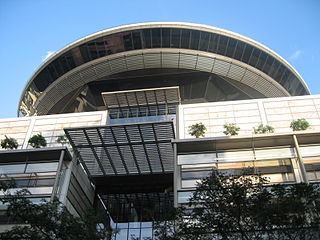
United States appellate procedure involves the rules and regulations for filing appeals in state courts and federal courts. The nature of an appeal can vary greatly depending on the type of case and the rules of the court in the jurisdiction where the case was prosecuted. There are many types of standard of review for appeals, such as de novo and abuse of discretion. However, most appeals begin when a party files a petition for review to a higher court for the purpose of overturning the lower court's decision.
The Asylum and Immigration Tribunal (AIT) was a tribunal constituted in the United Kingdom with jurisdiction to hear appeals from many immigration and asylum decisions. It was created on 4 April 2005, replacing the former Immigration Appellate Authority (IAA), and fell under the administration of the Tribunals Service.

In English law, natural justice is technical terminology for the rule against bias and the right to a fair hearing. While the term natural justice is often retained as a general concept, it has largely been replaced and extended by the general "duty to act fairly".
Service of process is the procedure by which a party to a lawsuit gives an appropriate notice of initial legal action to another party, court, or administrative body in an effort to exercise jurisdiction over that person so as to enable that person to respond to the proceeding before the court, body, or other tribunal.

Discovery, in the law of common law jurisdictions, is a pre-trial procedure in a lawsuit in which each party, through the law of civil procedure, can obtain evidence from the other party or parties by means of discovery devices such as a request for answers to interrogatories, request for production of documents, request for admissions and depositions. Discovery can be obtained from non-parties using subpoenas. When a discovery request is objected to, the requesting party may seek the assistance of the court by filing a motion to compel discovery.
A trial which is observed by trial judge without being partial is a fair trial.
Various rights associated with a fair trial are explicitly proclaimed in Article 10 of the Universal Declaration of Human Rights, the Sixth Amendment to the United States Constitution, and Article 6 of the European Convention of Human Rights, as well as numerous other constitutions and declarations throughout the world. There is no binding international law that defines what is not a fair trial; for example, the right to a jury trial and other important procedures vary from nation to nation./
Judicial Watch (JW) is an American conservative activist group and self-styled watchdog group that files Freedom of Information Act (FOIA) lawsuits to investigate claimed misconduct by government officials.

Jack Bertrand Weinstein is a Senior United States District Judge of the United States District Court for the Eastern District of New York. As of August 2018, he continues to maintain a full docket.
The Virginia General District Court (GDC) is the lowest level of the Virginia court system, and is the court that most Virginians have contact with. The jurisdiction of the GDC is generally limited to traffic cases and other misdemeanors, civil cases involving amounts of under $25,000. There are 32 GDC districts, each having at least one judge, and each having a clerk of the court and a courthouse with courtroom facilities.

An arbitral tribunal is a panel of one or more adjudicators which is convened and sits to resolve a dispute by way of arbitration. The tribunal may consist of a sole arbitrator, or there may be two or more arbitrators, which might include either a chairman or an umpire. Members selected to serve on the tribunal are typically professionals with expertise in law and mediation, although some scholars have suggested that the ideal composition of an arbitral tribunal should include at least one economist, particularly in cases that involve questions of asset or damages valuation.
The Canadian Afghan detainee issue concerns Government of Canada and/or the Canadian Forces (CF) knowledge of abusive treatment of detainees in Afghanistan. The abuse occurred after Afghans were detained by Canadian Forces, and subsequently transferred to the Afghan National Army (ANA) or the Afghan National Directorate of Security (NDS) during the War in Afghanistan. The issue has sparked heated debate since Article 12 of the Third Geneva Convention states that "the Detaining Power [Canada] is responsible for the treatment given [to prisoners of war]". If the allegations of torture are true it would mean Canada is guilty of war crimes.
The Virginia Circuit Courts are the state trial courts of general jurisdiction in the Commonwealth of Virginia. The Circuit Courts have jurisdiction to hear civil and criminal cases. For civil cases, the courts have authority to try cases with an amount in controversy of more than $4,500 and have exclusive original jurisdiction over claims for more than $25,000. In criminal matters, the Circuit Courts are the trial courts for all felony charges and for misdemeanors originally charged there. The Circuit Courts also have appellate jurisdiction for any case from the Virginia General District Courts claiming more than $50, which are tried de novo in the Circuit Courts.

Ahani v Canada [2002] 1 S.C.R. 72; 2002 SCC 2 is a significant decision of the Supreme Court of Canada in the areas of constitutional law and administrative law. It is a companion case to Suresh v. Canada , [2002] 1 S.C.R. 3. Both cases deal with the procedure for removal of Convention refugees for reasons of national security under the Immigration Act, R.S.C. 1985, and address questions of procedural fairness.

The New York State Department of Family Assistance (DFA), also known as the Department of Family Services, is a department of the New York state government. Its regulations are compiled in title 18 of the New York Codes, Rules and Regulations.

Procedural impropriety in Singapore administrative law is one of the three broad categories of judicial review, the other two being illegality and irrationality. A public authority commits procedural impropriety if it fails to properly observe either statutory procedural requirements, or common law rules of natural justice and fairness.

The Justice and Security Act 2013 is an Act of the Parliament of the United Kingdom, firstly to provide for oversight of the Security Service (MI5), the Secret Intelligence Service (MI6), the Government Communications Headquarters (GCHQ) on intelligence or security matters. Secondly the bill proposes to provide for the establishment of closed material procedures (CMP) in relation to certain civil proceedings. Thirdly to prevent the making of court orders for the disclosure of what the government deems to be sensitive information. The Bill was published as a Justice and Security Green Paper on 3 October 2011. It was presented to Parliament on 28 November 2012. It completed its House of Lords Committee stage on 7 February 2013. It had its second reading debate on 18 December 2012, and its third reading and report stage on 7 March 2013.

The Board of Veterans' Appeals is an administrative tribunal within the United States Department of Veterans Affairs (VA), located in Washington, D.C. It determines whether U.S. military veterans are entitled to claimed veterans' benefits and services. The Board's mission is to conduct hearings and decide appeals properly before the Board in a timely manner. 38 United States Code (U.S.C.) § 7101 (a). The Board's jurisdiction extends to all questions in matters involving a decision by the Secretary under a law that affects a provision of benefits by the Secretary to Veterans, their dependents, or their Survivors. 38 U.S.C. §§ 551(a); 7104(a). Final decision on such appeals are made by the Board based on the entire record in the proceedings and upon consideration of all evidence and applicable provisions of law and regulation. The Board's review is de novo.
Administrator, Transvaal v Theletsane is an important case in South African law, heard in an Appellate Division comprising Botha JA, Smalberger JA, MT Steyn JA, FH Grosskopf JA and Nicholas AJA. The case was heard on November 5, 1990; judgment was delivered on November 30. The respondents' attorneys were SV Khampepe, Johannesburg, and EG Cooper & Sons, Bloemfontein. The appellants had the State Attorney.
United States v. Watson, 423 U.S. 411 (1976), was a case decided by the Supreme Court of the United States that decided that a warrantless arrest in public and consenting to a vehicle search did not violate the Fourth Amendment.









